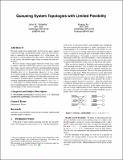Queueing system topologies with limited flexibility
Author(s)
Tsitsiklis, John N.; Xu, Kuang
DownloadTsitsiklis_Queueing system.pdf (500.7Kb)
OPEN_ACCESS_POLICY
Open Access Policy
Creative Commons Attribution-Noncommercial-Share Alike
Terms of use
Metadata
Show full item recordAbstract
We study a multi-server model with n flexible servers and rn queues, connected through a fixed bipartite graph, where the level of flexibility is captured by the average degree, d(n), of the queues. Applications in content replication in data centers, skill-based routing in call centers, and flexible supply chains are among our main motivations. We focus on the scaling regime where the system size n tends to infinity, while the overall traffic intensity stays fixed. We show that a large capacity region (robustness) and diminishing queueing delay (performance) are jointly achievable even under very limited flexibility (d(n) l n). In particular, when d(n) gg ln n , a family of random-graph-based interconnection topologies is (with high probability) capable of stabilizing all admissible arrival rate vectors (under a bounded support assumption), while simultaneously ensuring a diminishing queueing delay, of order ln n/ d(n), as n-> ∞. Our analysis is centered around a new class of virtual-queue-based scheduling policies that rely on dynamically constructed partial matchings on the connectivity graph.
Date issued
2013-06Department
Massachusetts Institute of Technology. Department of Electrical Engineering and Computer Science; Massachusetts Institute of Technology. Laboratory for Information and Decision SystemsJournal
ACM SIGMETRICS Performance Evaluation Review
Publisher
Association for Computing Machinery (ACM)
Citation
John N. Tsitsiklis and Kuang Xu. 2013. Queueing system topologies with limited flexibility. SIGMETRICS Perform. Eval. Rev. 41, 1 (June 2013), 167-178.
Version: Author's final manuscript
ISSN
01635999